Beginning
This guide will also not cover any changes to parts from ksp1, i do not think there are any major changes but if there are, they aren’t going to be here
This guide is not a tutorial on playing the game and assumes you understand the basics of the game and the terminology used, but will be written with people who have never played ksp1 in mind
Parts are sorted in order top to bottom as they are in game
Some part descriptions are cut off as due to a bug with some parts the full description is impossible to read, i will update the descriptions once this is fixed
I am also only running the game at 1080p, so the images of the part icons are really low quality
I wanted to make this guide because some people dont know of all of the parts in the game, i have not seen or heard a single person mention the nuclear reactor or massive rtg yet, so i would like to make this to inform people about them and their use cases.
Another note is i mention lithobraking a lot on high impact tolerace parts for some reason. To new players this is generally considered a bad strategy despite me mentioning it so much
Command
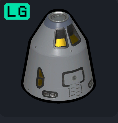
Category: Five Seat Command Pod
Description: “Originally called the Cockpit-plus-two, the 5 seat “Cockatoo” is a second-generation command pod that provides both safety and comfort It is rumored to have enough room to pack several days of emergency snack rations and board games”
Useful stats:
- As the description states this large command pod holds 5 kerbals
- The reaction wheels use 1 ec/s (when reaction wheels use electricity, as they currently dont)
- Has built in rcs thrusters
- Holds 225 ec
- Holds 0.24t of monopropellant
- Weighs 4.5 tons
Use cases: You need a rocket that can carry 5 people that is relatively small, or you want 5 people in a command pod part. Or maybe you just want a really big command pod.
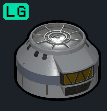
Category: Four Seat Lander Can
Description: “Is the Mk3-L one of the best lander cans available? Quite possibly. Was it designed with 4 seats just to get Jeb, Val, Bob & Bill to stop arguing over who got to go down on a landing? Absolutely!!!”
Useful stats:
- Holds 4 kerbals
- Reaction wheels use 0.650 ec/s
- Holds 175 ec
- Holds 0.3 tons of monopropellant
- Weighs 3.646 tons
Use cases: Bringing every kerbal job type down to the surface in one part +1 extra, or for especially big landers, or if you feel bad leaving someone in orbit
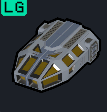
Category: Truck Cab
Description: “Big and mean best describes the “Bulldog.” the only command pod specifically designed with heavy rovers in mind. Our marketing department would like to point out it looks really cool on rockets too.”
Useful stats:
Holds 3 kerbals (not mentioned anywhere on the part itself, devs pls fix)
Reaction wheel uses 1.5 ec/s (doesn’t matter much, should be turned off on a rover for the most part)
- Holds 450 ec
- Holds no monopropellant
- Has a very high impact tolerance of 30m/s
- Weighs 3.823 tons
- Has 2 attachment points as in the image shown below
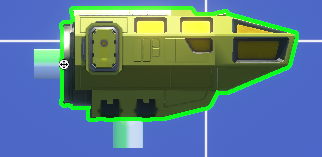
Use cases: Very big rovers for some extra roving fun, or maybe lithobraking with its high impact tolerance, a rover made with this might not need extra batteries because of its large ec storage. Would also look really cool on a vtol style lander
Fuel Tanks
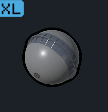
Category: Radial Mounted Monopropellant Tank
Description: “When Stratus Corp began designing their extra large radial monopropellant tank, the team was both thrilled and horrified. They immediately agreed to name this mass…” (Cut off description)
Useful stats:
- Massive
- Huge
- Ginormous
- Weighs 67.5 tons
- Holds 60 tons of Monopropellant
- Radial mount only (only attaches to the side for new players)
Use cases: When you need enough monopropellant to move the entirety of kerbin to another galaxy. Probably for massive motherships but as to why somebody would need this much monopropellant even on a mothership is a guess to me.
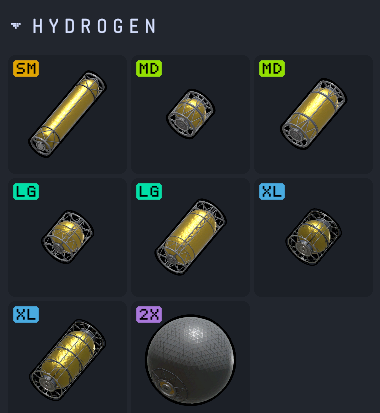 Since this isnt a part but a category, im breaking the format here, this will happen in all future categories so be warned.
Since this isnt a part but a category, im breaking the format here, this will happen in all future categories so be warned.
Hydrogen tanks act very similarly to methane fuel tanks, however only holding hydrogen instead of methane. The fuel tanks are much lighter than methalox fuel tanks, however the fuel is lighter and less dense too, meaning you will need more hydrogen tanks to equal methalox fuel tanks in delta v or weight. Hydrogen is needed to run nuclear engines. It comes in sizes and shapes that methalox or methane tanks already exist in, with one very big exception that is going to be below this
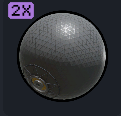
Category: [TBD] (All of the other hydrogen fuel tanks are in the category “Hydrogen Fuel Tank” this may be the same, but no official category)
Description: “[TBD]”
Useful stats:
- Weighs 56.250 tons
- Holds 50 tons of hydrogen
- ORB
- Very large, even larger than the stratus-v embiggened
Use Cases: Holds a lot of hydrogen in a compact space, good to go very far if you like nuclear engines, and has a perfect mounting point for the SWERV engine
Engines
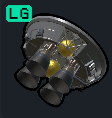
Category: “Orbital Methalox Engine”
Description: “The “Labradoodle” is Kerbodyne’s newest engine. It does not perform well in an atmosphere, but it is very efficient in vacuum, making it a great choice for upper stages. Rumor has it the Labradoodle was actually named by a safe-flying web-caster during an interview.”
Useful stats:
- Weighs 5.25 tons
- Max vacuum thrust 650 kN
- ISP vacuum 343 seconds
- Gimbal range of 4.5 degrees (no roll)
- Alternator makes 7 ec/s
- Runs on methalox
Use Cases: Orbital engine, or really large landers
Trivia: The “safe-flying web-caster” in the description is likely a reference to the youtuber “Scott Manley”
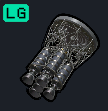
Category: Hydrogen Deep Space Engine
Description: “The “Super Warm Engine for Rocket Vehicles” is a gas-core nuclear engine designed for high thrust operations. It consists of five tubes attached to a structure that allows them to gimbal. Jeb swears he did not find those tubes in the spare lightbulbs box”
Useful stats:
- Weighs 10 tons
- Max thrust at 1 atm (sea level) 154.5
- Max thrust at vacuum 700kn
- ISP at 1 atm (sea level): 320 s
- ISP at vacuum 1,450 s
- Gimbal range of 4 degrees (no roll)
- Alternator makes 10 ec/s
- Runs on Hydrogen
Use Cases: Moving large nuclear powered craft, due to its immense efficiency and thrust you will be able to go practically anywhere with this big rocket. Also due to its high thrust for a nuclear engine, it is possible to use it within the atmosphere to a reasonable effectiveness. However, it is still recommended to use it in space to avoid irradiating the ksc.
Structures
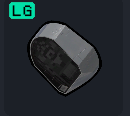
Category: Mk3 Engine Mount
Description: “The EM-500 was designed as an engine mount for Mk3 style rockets and spaceplanes. It can withstand a tremendous amount of heat. It takes hours to cool, making it ideal for a…” (cut off description)
Useful stats:
- Weighs 0.7 tons
- Max temp of 750k (despite the description, it does not withstand a tremendous amount of heat, as 750k is below average)
- Impact Tolerance 40 m/s
Use Cases: Most obvious use case is space shuttles, however its large impact tolerance may be useful in landing.
Category: Truck Chassis
Description: “Built to accompany the “Bulldog” truck cab, the “Rottweiler” truck chassis is designed to make your rover building faster and easier. If you wish to spend less time building and more ti…” (cut off description)
Useful Stats:
- Weighs 1 ton
- Max temp of 750k
- Impact Tolerance 50 m/s
Use Cases: ??? I am really not sure on this one, it is just a very thin part with 3 attachment points as pictured below. Maybe the high impact tolerance could be used to lithobrake, but its really heavy.
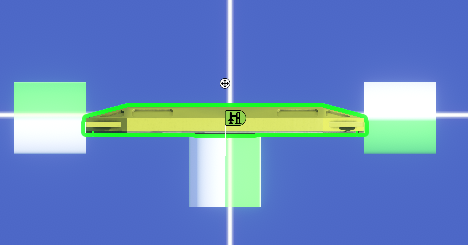
Coupling
Payloads
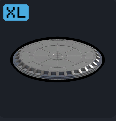
Category: Airstream Protective Fairing
Description: “The AE-FF500 protective fairing one of FLOOYD Dynamics favorites just for the name itself: “Quahog.” Try saying it five times fast!” (No, i didnt make a typo, thats the description)
Useful Stats:
- Weighs 2.4 tons
Use Cases: Protect sensitive payloads from being destroyed during takeoff. Can also be useful for decorative purposes
Trivia: The name “Quahog” is a name for a type of clam, all of the other fairings are also named after clams, this is likely due to a fairing design type known as “Clamshell”
Tutorial: How to use the new fairing system
Step 1: Press the wrench icon

Step 2 Drag on the arrows to move the section
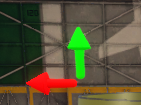
Step 3 To add a new section / bend press the plus button

Step 4 When you are done press the checkmark, or press the X to cancel and erase the fairing

Category: 5M Cargo Nose
Description: “The engineering team at Sean’s Cannery cry when they see empty nosecones. They built the CN-500 cargo nose to satisfy their need to fill every spare centimeter of space”
Useful Stats:
- Weighs 0.25 tons
Use Cases: Holding cargo, duh
Note: Here is how it opens
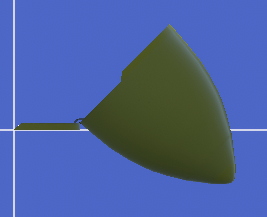
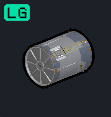
Category: Eight Seat Crew Cabin
Description: “Originally two “Hitchhiker” crew cabins welded together, the PPD-20 was named the “Wayfarer.” It has additional storage compartments for snacks, board games, stuffed toys a…” (cut off description)
Useful Stats:
- Weighs 6.5 tons
- Holds 8 kerbals
Use Case: Space stations, or potentially colonies when they are added
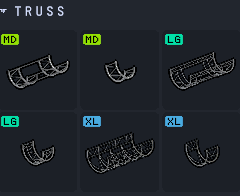
These may be used for holding cargo, 2 fit together really well and they have internal and external attachment points, or they could be used as hollow structural pieces on large motherships
Aerodynamics
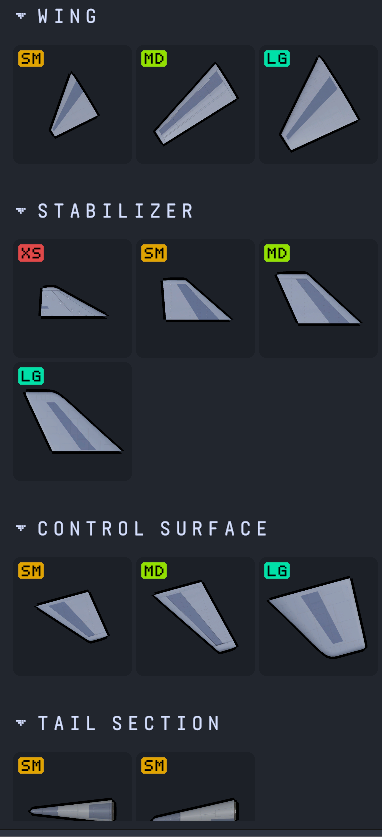
To edit them press the wrench icon

Then a menu will pop up that looks like this
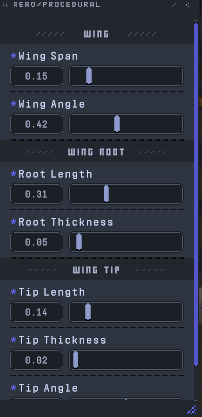
Drag the sliders and the wings will update in real time
Im not a plane guy so i cant tell you how all the sliders affect your flight but im sure someone in the comments does, and this is kerbal space program after all, feel free to crash a few times
Note there is a bug currently where center of lift and mass wont update in real time, close the menu to update it
Ground

Category: Heavy Duty Extendable Landing Leg
Description “Arguably the most handsome of the landing legs, the “Wallaby” is both strong and durable, and comes in its own stylish protective casing. The next Kerbal we catch hiding snacks i…” (cut off description, but i would like to imagine it says “will personally beat the ♥♥♥♥ out of”)
Useful Stats:
- Weighs 1 ton
- Impact Tolerance 20 m/s
Use Cases: Big ass landers
Electrical
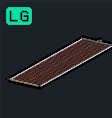
Category: Huge Retractable Solar Array
Description: “The SP-XXL is a breakthrough in solar panel technology. It is not just 1.5 times larger than the “Gigantor.” it uses a completely new deployment design that promises it to be stronger and safer than previous models.”
Useful stats:
- Weighs 0.467 tons
- Generates 35 ec/s
Use Cases: UNLIMITED POWER!!!!!!!!!!!!!!!!!! For when you need a lot of power forever and dont care if it cuts out during dark or far away from the sun
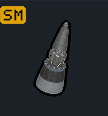
Category: [TBD] (Its a nuclear reactor)
Description: “Once it’s activated, this reactor puts out a steady flow of electricity for many years. The inventor was inspired to pursue a conical form after burning her tongue on a rolled crepe cone. The pointy end is especially hot and a wee bit radioactive.”
Useful stats:
- Lasts 333 hours at max power
- Makes 50 ec/s at max power
Use Cases: Need lots of power on a small package, possibly good for interplanetary missions
Notes:
- Reactor does not start at full power, it starts at 50%
- Reactor holds 1t of uranium, as of right now there is no way to hold more uranium
- Reactor only has 1 attachment point and can not be radially attached to, making it hard to place on a craft
- Reactor does not automatically control power, only set it to what you need to avoid it running out of uranium too quickly
- Reactor does not start on by default, you can toggle it in the vab or in flight
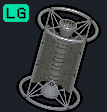
Description: “The RTG-500 is a second generation radioisotope thermoelectric generator capable of generating a steady flow of electricity for many years. It also produces a moderate amount of heat, so refrain from standing near one too long. It’s not like you’ll start to glow.”
Useful Stats:
- Weighs 5 tons
- Max Temp 600K
- Impact Tolerance 8m/s
- Internal battery of 500 ec
- Lifetime: 108Y 288D 01:48:40
- Generates 10 ec/s
Use cases: Likely very large ships that need a steady supply of power that cant mount a nuclear reactor or a nuclear reactor wouldnt last long enough (or maybe some catch to reactors in the future)
Note: Afaik there is no way to extend the lifetime, when its out its gone for good, not a good choice for a relay network
Utility
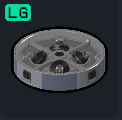
Category: Large Reaction Wheel Stabilizer
Description: “The LRW-375 uses four gyroscopes working in sync to provide an impressive amount of torque and stability in even the largest craft. It will also eat your batteries like candy while in use.
Useful stats:
- Weighs 0.675 tons
- Uses 3.897 ec/s while in use
- 45kN of torque in all directions
Use Case: When you really want your craft to spin and now
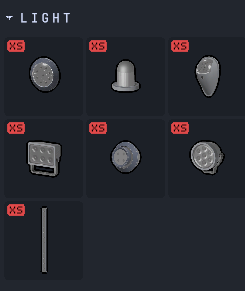
Not sure if all of them are new, but some are
they radially mount, are somewhat fragile, glow, and use barely any electricity (but still some)

Category: Compound Telescoping Ladder
Description: “It is hard to put in words how proud the team at Rokea Inc. are of the new “Bobus” Mobility Enhancer. This incredible device not only improves a Kerbal’s vertical mobility, they can…” (cut off description)
Useful Stats:
- Weighs 0.1 tons
Use Case: When a kerbal needs to get up

